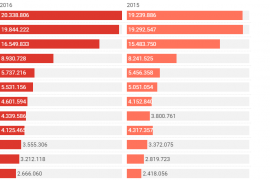The study “The Global Philanthropy Report: Perspectives on the global foundation sector“, recently published by a group of researchers from the Hauser Institute for Civil Society of Harvard University and funded by the UBS company, is the largest analysis carried out to date on the main trends in the world of philanthropy.
This work offers a global picture of this sector, where more than 260,000 foundations operate in the 39 countries analyzed. Most of them are concentrated in Europe (60%) and North America (35%).
In total, the foundations analyzed have assets of almost $ 1.5 trillion that are mainly concentrated in the United States (60% of the total) and Europe (37%).
The number one country in this ranking is, by far, the United States, where its foundations manage assets of 890,000 million dollars. The foundations of the second country in the ranking, Holland, move assets of 108,000 million dollars, and those of Germany, third country in the ranking, have 92,900 million dollars.
Spain occupies the eighth position in the ranking with a total of 29,000 million dollars in assets, just behind France and above countries such as China, Australia or Canada.
72% of the foundations were created during the last 25 years, which shows that it is a fairly young and growing sector.
One of the conclusions of the study is that the philanthropic sector is very fragmented. In fact, 58% of existing foundations do not collaborate with other foundations.
There are huge differences between foundations. Thus, half of them do not have paid staff and their budgets do not reach one million dollars, which limits their capacity for action.
The area where foundations are most active is education. A third of them work in this sector considering that it is the one that offers more opportunities for individuals and can also become an important engine of economic prosperity for countries.



















